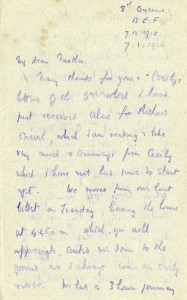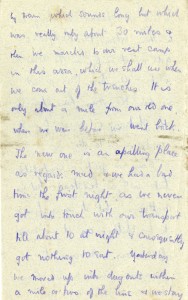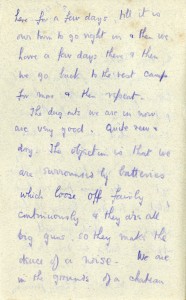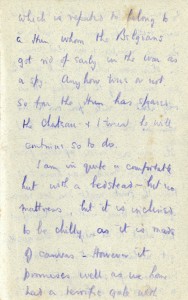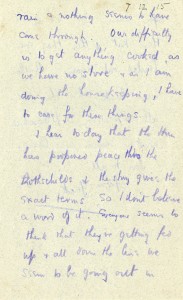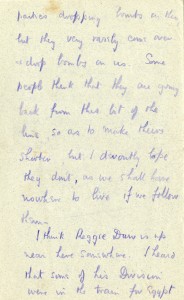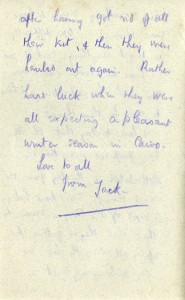Transcription
8th Queens.
B. E. F.
7. 12. 1915.
(7. 1. 1916)
My dear Mother,
Many thanks for yours & Cecily’s letters of the 2nd which I have just received. Also for Richard Carvil, which I am reading & like very much & Quinney’s from Cecily which I have not had time to start yet. We moved from our last billet on Tuesday, leaving the home at 4.45 a.m, which, you will appreciate, suited me down to the ground as I always was an early riser. We had a 3 hour journey by train, which sounds long but which was really only about 30 miles & then we marched to our rest camp in this area, which we shall use when we come out of the trenches. It is only about a mile from our old one, where we were before we went back. The new one is an appalling place as regards mud & we had a bad time the first night, as we never got into touch with our transport till about 10 at night & consequently got nothing to eat. Yesterday we moved up into dug outs within a mile or two of the line & we stay here for a few days, till it is our turn to go right in & then we have a few days there & then we go back to the rest camp for more & then repeat.
The dug outs we are in now are very good. Quite new & dry. The objection is that we are surrounded by batteries which loose off fairly continuously & they are all big guns, so they make the deuce of a noise. We are in the grounds of a chateau which is reputed to belong to a Hun, whom the Belgians got rid of early in the war as a spy. Anyhow true or not, so far the Hun has spared the chateau & I trust he will continue so to do.
I am in quite a comfortable hut with a bedstead – but no mattress, but it is inclined to be chilly as it is made of canvas. However it promises well, as we have had a terrific gale with rain & nothing seems to have come through. Our difficulty is to get anything cooked, as we have no store & as I am doing the housekeeping, I have to care for these things.
I hear to-day that the Hun has proposed peace thro’ the Rothschilds & the story gives the exact terms so I don’t believe a word of it. Everyone seems to think that they’re getting fed up & all down the line we seem to be going out in parties dropping bombs on them, but they very rarely come over & drop bombs on us. Some people think that they are going back from this bit of the line, so as to make theirs shorter, but I devoutly hope they don’t, as we shall have nowhere to live if we follow them.
I think Reggie Dane is up near here somewhere. I heard that some of his Division were in the train for Egypt after having got rid of all their kit, & then they were hauled out again. Rather hard luck when they were all expecting a pleasant winter season in Cairo.
Love to all
from Jack.
Commentary
Peirs has rejoined his unit at the front. As the letter indicates, he is billeted behind the lines on the grounds of an old Chateau. The battalion had been in the lines for a few days before Peirs arrived.
His journey from England to France took two days and seems to have been quite boring due to slow travel. When Peirs arrived at the unit HQ, he found that the grounds were comfortable enough, but that they were surrounded by artillery batteries that shook his dug-out when they fired their shells at the enemy opposite. He mentions that units around him had begun bombing raids on Germans in their trenches – where small(ish) groups of men would cross no-man’s land at night and drop bombs on their opponents – an attempt at harassing the enemy, but also, gathering intelligence on the force opposite.
One thing to consider is the notion of active vs. inactive warfare. A common misconception of the western front is that it was static. Though trench lines appear to be so on paper, there was constant movement within the trenches and behind them. As these letters indicate, units were rotating in and out of the lines, engaging in training, etc., each soldier preoccupied in hundreds of little tasks to maintain their lines and their ability to stay healthy enough to keep fighting.

